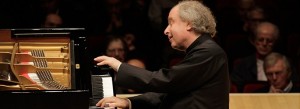The Hungarian pianist Sir András Schiff must like Los Angeles or Disney Hall, or both, because he has graced our fair city with his complete Beethoven piano sonata cycle (in 2008-2009) and his complete cycle of Bach’s keyboard works (from 2012-2014). Now, he brings to LA his new cycle, The Last Sonatas (of Haydn, Mozart, Beethoven and Schubert).
On March 4, Schiff performed his second in the series featuring the Sonata in B-flat major, K. 570 by Mozart, the Sonata in A-flat major, Op. 110 by Beethoven, the Sonata in D major, Hob. XVI:51 by Haydn, and the Sonata in A major, D. 959 by Schubert.
Schiff is the consummate musician, and he held the audience spellbound with his deeply personal and reflective interpretations of these late masterpieces by the four greatest classical composers. Unlike many pianists, who like to showcase their technique, for Schiff it’s about the music first.
To understand his technique, one must first understand his demeanor. He glides on stage, arms barely moving as we walks. When he bows, his arms hardly move, although occasionally he clasps his hands together in appreciation of the audience. When he puts his fingers on the keyboard, they seem boneless. It’s sometimes hard to believe he can actually hit all the notes. Of course, he does. He doesn’t try to impress with a lot of forte playing. In fact, his fortes are generally less dynamic than other pianists. He cares about the interpretation and the effect on the listener. And the effect is always one of sheer delight.
The Mozart sonata was paired with the Beethoven, and the Haydn was paired with the Schubert, probably more for timing than anything else as the Beethoven and Schubert sonatas are the longest, and the Mozart and Haydn sonatas are the shortest. But the effect was more than that; it was musical. Schiff is a thinking person’s pianist, even though his interpretations are so inspired that they sound as if they are spontaneous.
Schiff began with the Mozart. Although one of the composer’s last in the genre, this sonata retains an almost childlike simplicity which, of course, is deceptive because it takes a truly mature and thoughtful musician to convey such deep musical emotion, especially in the second movement (Adagio) with its hymn-like theme.
Schiff concluded the first half with Beethoven’s next to last sonata, the Op. 110. This was a truly inspired performance that was at times ethereal. The sonata, like the other late sonatas of Beethoven, is compact and dense with simple, beautiful melodies, and Schiff made sure they were always front and center. His arpeggios in the first movement were played so lightly that it’s hard to imagine that it was possible to still produce sound at all. In the Allegro molto, Schiff could have pounded the keys and rushed the movement, but instead used a bit of ritardando and imbued the movement with more of a playful feel than even Beethoven may have intended. The brief third movement (Adagio ma no troppo) was wrenching, and the fourth movement, with its famous fugue, saw Schiff bouncing up and down when the octave bass notes got their turn with the fugue theme. Then after the glorious G major chords reach their crescendo, the transition back to the fugue was exquisitely airy.
The Haydn, like the Mozart and Beethoven, shows a composer late in his career at the height of his powers, writing an almost childlike sonata. It is a very short two-movement piece with Haydn at his typical playful and humorous self, and Schiff didn’t try to make it seem more profound. The result was a welcome lighthearted hors d’oeuvre to the long and demanding Schubert sonata.
The Schubert begins with an A major announcement which seems to belie the fact that it was written in his last year of life when he was both ill and poor. The second movement, however, is so heart-wrenching that one wonders if he can lift himself up out of the pathos. But, like other composers in the throes of anguish (like Beethoven), Schubert surprises us with a light and airy Scherzo. The finale (Rondo: Allegretto) thankfully doesn’t return to the dread of the second movement, but rather strikes a middle ground that is distinctively Schubert, that is, until the end where, like the last Beethoven sonata, much of the writing is in the higher registers. He doesn’t leave us there like Beethoven, but rather concludes with a defiant A major octave.
After several curtain calls, Schiff graced the audience with two encores, the Schubert Impromptu No. 2 in A-flat major, D. 935 and, so as not to leave on a melancholic note, Beethoven’s Bagatelle Op. 126 No. 6.
Schiff is a one-of-a kind pianist who makes the piano sing. At the age of 62, he has won all the major awards and received all the possible accolades. Every time he performs, it’s easy to understand why he is truly one of the world’s greatest pianists and musicians.
—Henry Schlinger, Culture Spot LA
For information about upcoming concerts, visit www.laphil.com.






